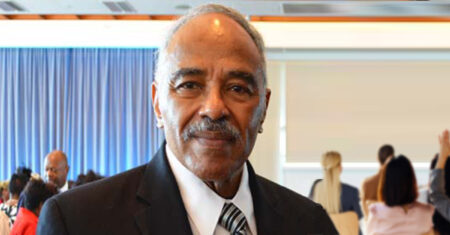By Stacy M. Brown
Black Press USA Senior National Correspondent
The Trump administration has declared that nursing is not a professional degree, striking directly at the heart of America’s healthcare workforce and landing hardest on Black women, who make up nearly 13 percent of the national healthcare labor force and almost 10 percent of registered nurses. The administration frames the move as a technical adjustment to loan classifications. For Black women and the communities that rely on them, the consequences are far more severe.
“This is a gut punch for nursing,” Patricia Pittman of George Washington University stated. “Education from ADN to BSN and beyond is the single best way to retain nurses, especially in underserved communities.”
Under the One Big Beautiful Bill Act, nursing, physical therapy, physician assistants, and other frontline health professions have been stripped of professional degree status. Students in these fields can borrow only $20,500 per year with a total cap of $100,000. Students in law, dentistry, medicine, and other protected fields can borrow up to $50,000 per year and $200,000 total. Nursing students report tuition and clinical training costs that far exceed the new caps, leaving many unable to continue their education.
The American Association of Colleges of Nursing issued a direct warning. “Excluding nursing disregards the rigorous education, licensure, and direct patient care that define our profession,” the organization stated. “This decision threatens the healthcare of patients in communities across the country.”
The nation already faces a shortage of hundreds of thousands of nurses. Graduate degrees are required for advanced practice roles. Without meaningful access to federal loans, fewer students will enter or complete these programs. Black women, who rely on student loans at far higher rates than white students, now face a barrier to financial mobility and advancement in the nursing profession.
Research shows that Black nurses often serve in underserved rural and urban communities. Studies of Black nurse practitioners describe persistent racism, heavy workloads, and limited institutional support. Participants in one national qualitative study described taking additional time to address inequities and care for patients facing social and economic barriers while contending with organizational barriers and burnout.
Kim Brundidge, a doctoral nursing student and practicing nurse, described the consequences for the next generation of providers. “If students are not able to afford advanced education, the quality and number of nurses entering the workforce will decline,” she said.
Local and national nursing groups are preparing challenges to the reclassification. Leaders across the field warn that the bill undermines the country’s ability to meet basic healthcare needs.
“In many communities across the country, advanced practice registered nurses ensure access to essential and high-quality care that would otherwise be unavailable,” Jennifer Mensik Kennedy of the American Nurses Association said. “Limiting nurses’ access to graduate education threatens the very foundation of patient care.”






